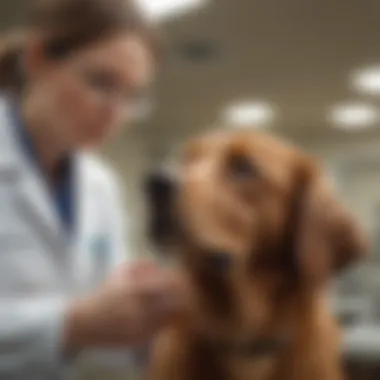Effective Remedies for Your Dog's Upset Stomach


Intro
Understanding canine digestive issues is an essential skill for every dog owner. An upset stomach in dogs can manifest through various symptoms, such as vomiting, diarrhea, or lethargy. Many factors contribute to this discomfort, ranging from dietary indiscretions to underlying health conditions. Recognizing these symptoms early and responding effectively can make a significant difference in your dog's well-being.
In this guide, we explore remedies and interventions that pet owners can implement to address their dog's digestive distress. It covers common causes of an upset stomach, effective home treatments, dietary adjustments, and when to seek assistance from a veterinarian. This resource aims to empower dog owners with knowledge and practical strategies to enhance the health of their furry friends, providing peace of mind during troubling times.
Understanding Your Pet
Breed Traits
Different dog breeds exhibit unique traits that can influence their digestive health. For instance, large breeds like Great Danes are more susceptible to bloat, while smaller breeds may experience gastrointestinal issues due to rapid eating. Recognizing these tendencies is vital for personalized care.
Common Temperaments
A dog’s temperament can also play a role in their digestive health. Anxiety-prone dogs may develop stomach issues related to stress. Understanding how a dog's behavior impacts their digestion can help in managing their overall well-being.
Special Needs
Certain breeds have specific dietary needs or restrictions. For example, dogs with allergies or intolerances require careful monitoring of their food intake. Awareness of such needs can guide owners in choosing the right remedies and diets to alleviate digestive distress.
Pet Care Essentials
Nutrition and Feeding Guidelines
Proper nutrition forms the foundation of good digestive health. Feeding a balanced diet with high-quality ingredients prevents digestive problems. It is important to establish fixed feeding times, as routine can help regulate a dog's digestive system.
Grooming Tips and Techniques
Regular grooming influences a dog's health, including digestion. It helps reduce hair ingestion that can lead to blockages, particularly in long-haired breeds. Brushing dogs regularly is essential, especially during shedding seasons.
Health and Wellness
Routine veterinary check-ups are crucial for maintaining not only a dog’s overall health but also for identifying potential digestive issues early. Keep up with vaccinations and preventive care to support digestive wellness in your companion.
Training and Behavior
Basic Training Techniques
Training can alleviate stress in dogs, which is beneficial for digestive health. Basic commands can promote calmness and reduce anxiety, potentially preventing nausea triggered by stress.
Behavioral Problems and Solutions
If a dog's behavior shows signs of distress or anxiety, interventions may be needed. Desensitization and counter-conditioning are methods that can aid in modifying troublesome behaviors that affect digestion.
Mental Stimulation Activities
Engaging dogs in mental activities can redirect their focus and reduce anxiety. Activities like puzzle toys can keep them occupied and help prevent stress-induced digestive issues.
Engaging with Your Pet
Interactive Games and Toys
Using interactive games can promote exercise and prevent boredom. They can also strengthen the bond between the dog and owner, contributing to an overall positive environment reducing the likelihood of digestive distress.
Safe Outdoor Activities
Taking your dog out for walks allows exploration and socialization. However, the type of activities should match their physical capabilities and breed traits to avoid overexertion, which can lead to stomach issues.


Family-Friendly Pet Interactions
Encouraging positive interactions with family members helps dogs feel secure. Stability in their environment can keep anxiety levels low and thus minimize potential digestive problems.
Pet Adoption and Integration
Choosing the Right Pet for Your Lifestyle
Before adopting a dog, assess your lifestyle to ensure compatibility. Different breeds require various levels of care, exercise, and attention, which can significantly impact their digestive health.
Preparing Your Home for a New Pet
A thorough preparation can ease the transition for new pets. Ensuring a safe environment and providing appropriate dietary options enhances their chances of avoiding digestive problems.
Tips for Smooth Preface
When introducing a new dog to your home, gradual introductions can promote a sense of safety. Proper integration is essential for reducing anxiety in the new pet, which is instrumental in preventing digestive issues.
Important Note: Monitoring your dog's reactions and consulting with a vet can guide you in addressing any signs of digestive distress effectively.
Foreword to Canine Upset Stomach
An upset stomach in dogs is a significant concern for many pet owners. Understanding this issue is crucial not only for maintaining your dog's well-being but also for improving your overall relationship with your pet. The canine digestive system is complex, and various factors can lead to gastric disturbances. Acknowledging the symptoms and causes allows pet owners to take timely and appropriate action. This can prevent minor issues from escalating into serious health problems.
Understanding Canine Digestive System
The canine digestive system comprises several organs that work together to break down food. Dogs have a simple stomach which is designed for quick digestion. Food enters the stomach, where it is mixed with gastric juices. This process helps break down proteins efficiently. The food then moves into the small intestine, where nutrients are absorbed into the bloodstream. Any undigested food is passed to the large intestine for further processing.
It is important to note that a dog’s digestive tract varies in efficiency from that of humans. Dogs can often tolerate different types of food that can upset human stomachs. However, they are still susceptible to digestive disorders, and this is where understanding how their system functions becomes vital. Knowledge about their digestive process, therefore, enables owners to better recognize when their pets are in distress.
Common Symptoms of Upset Stomach in Dogs
Identifying the symptoms of an upset stomach is essential for prompt treatment. Dogs may exhibit various signs, such as:
- Vomiting: This is one of the most common indicators. Vomiting may also appear with bile if it persists.
- Diarrhea: Loose stools can signal digestive distress.
- Lethargy: A dog that is less active may be experiencing discomfort.
- Loss of Appetite: A sudden disinterest in food can be concerning.
- Bloating: Swelling in the abdomen might indicate a more serious condition.
While these symptoms may manifest individually or in combination, they are critical signals that a pet owner should closely monitor. If they become severe or prolonged, veterinary assistance is recommended. Understanding these symptoms prepares pet owners for a more responsible approach when addressing their dog's health.
Proper awareness and timely response can improve recovery and enhance your dog's comfort during gastrointestinal distress.
Common Causes of Canine Upset Stomach
Understanding the common causes of an upset stomach in dogs is essential for effective treatment and prevention. Recognizing these issues helps pet owners make informed decisions. When a dog shows signs of digestive distress, identifying the underlying cause is crucial to address the problem effectively. This section delves into several factors, ranging from dietary habits to emotional well-being, that may contribute to gastrointestinal disturbances.
Dietary Indiscretion
Dietary indiscretion refers to a dog's tendency to consume unsuitable foods. Dogs are often scavengers; they may eat items that are not part of their regular diet. This can include spoiled food, foreign objects, or table scraps. Such behavior can lead to stomach upsets. Pet owners should be mindful of what they allow their dogs to access.
The importance of proper diet cannot be understated. A well-balanced diet tailored to a dog's specific needs helps in maintaining digestive health. When new or unusual foods are introduced suddenly, the dog's stomach may react negatively. It's advisable to transition between diets gradually. If a dog shows repeated signs of digestive upset after eating certain foods, this may indicate a need for dietary adjustments.
Food Intolerance and Allergies
Though commonly overlooked, food intolerances and allergies are significant contributors to canine upset stomachs. Some dogs have difficulty digesting specific ingredients, such as grains, proteins, or additives. Symptoms may manifest as bloating, gas, or diarrhea. Identifying food intolerance may require dietary elimination processes.
In contrast, food allergies can cause more severe reactions, including skin irritations. It’s crucial to consult with a veterinarian to identify potential allergens through specific testing. Adjusting a dog's diet to avoid problem ingredients allows for a more stable digestive process, enhancing their overall health.
Infections and Parasites
Infections and parasites pose another serious risk to canine digestive health. Pathogenic microorganisms, such as bacteria, viruses, and worms, can disrupt the normal functioning of the gastrointestinal tract. Symptoms vary but often include vomiting, diarrhea, and lethargy. Regular deworming and vaccinations are vital preventive measures.


Veterinary check-ups help in early detection of these issues. Diagnostics may include stool tests to identify parasites or tests for infectious agents. Prompt treatment can mitigate the impact of these infections on a dog's health.
Stress and Anxiety Factors
Stress and anxiety are often underestimated in their effects on a dog's digestive system. Just like humans, dogs can experience gastrointestinal disturbances in response to stress. Common stressors include changes in environment, new family members, or loud noises. Behavioral signs, such as excessive barking or hiding, may indicate that stress is affecting a dog's body.
Creating a calm environment can help reduce anxiety. Techniques include establishing routines and providing safe spaces for dogs. Recognizing these emotional triggers allows pet owners to address them proactively, reducing the stress impact on their pets' digestive health.
Addressing the root causes of an upset stomach leads to effective management, boosting your dog's well-being significantly.
Home Remedies for Dog Upset Stomach
When addressing canine digestive distress, home remedies serve as valuable immediate responses that pet owners can easily implement. These remedies often focus on non-invasive methods that can provide relief to dogs with upset stomachs. Understanding these options empowers owners to take action promptly, minimizing discomfort for their pets while avoiding panic.
Fasting as a Temporary Solution
Fasting is a common approach to help dogs suffering from an upset stomach. The primary idea behind fasting is to give the digestive system a break. During this period, food is withheld for about 12 to 24 hours, depending on the dog's size and age. This pause allows the intestines to rest and recover from irritation.
However, it's crucial to ensure that dogs have access to water during fasting. Hydration is essential. If the dog does not improve after a short fast, the next option may be necessary. While fasting can be beneficial, it should not be overused, and pet owners must monitor their dog's overall condition. If they show any signs of severe distress, it is time to consider veterinary assistance.
Bland Diet Recommendations
Once the fasting period is over, transitioning to a bland diet can further aid recovery. This diet typically includes easy-to-digest foods that do not irritate the stomach. Common options include:
- Boiled chicken (skinless)
- White rice
- Pumpkin puree (not the spiced pie filling)
- Sweet potatoes
These ingredients are gentle on the digestive system and provide necessary nutrients without overwhelming the dog. It is advisable to introduce the bland diet gradually and monitor for any adverse reactions. If the dog tolerates this diet well for a few days, owners can slowly reintroduce their regular food.
Incorporating Probiotics
Probiotics can play a significant role in restoring digestive balance. These beneficial bacteria help in gut health by aiding digestion and promoting a healthy microbiome. Many pet owners find that supplements specifically designed for dogs can effectively alleviate symptoms.
Foods like plain yogurt may also serve as a natural source of probiotics. Offering these can assist in balancing the dog's intestinal flora. Always check with a veterinarian before introducing any new supplements or treats to ensure compatibility with the dog's overall health.
Hydration Importance
Hydration cannot be emphasized enough when dealing with digestive issues in dogs. An upset stomach may lead to vomiting or diarrhea, resulting in a loss of essential fluids and electrolytes. Owners must ensure their dogs drink enough water to prevent dehydration.
In cases where dogs refuse to drink water, adding low-sodium broth can enhance flavor and encourage fluid intake. Keeping a constant watch for signs of dehydration is vital. These signs include lethargy, dry gums, and loss of skin elasticity. If any of these signs are noted, it is imperative to seek veterinary assistance immediately.
Remember: Always observe your dog's behavior and symptoms carefully. Consistent monitoring is key to effective home care.
When to Seek Veterinary Assistance
Understanding when to seek veterinary assistance for your dog’s upset stomach is essential for pet owners. While some instances of digestive distress can be managed at home, others can signal a more serious underlying issue. It is crucial to differentiate between normal digestive troubles and conditions that may require professional intervention.
Consulting a veterinarian allows for accurate diagnosis and effective treatment. Veterinary professionals possess the knowledge to determine the cause of the symptoms through examinations and, if necessary, diagnostic tests. By acting promptly, pet owners can mitigate pain and discomfort for their dogs and possibly prevent more severe complications.
Duration and Severity of Symptoms
The duration and severity of symptoms are important factors that help in deciding when to consult with a veterinarian. If your dog experiences an upset stomach that lasts more than 24 hours, this is a clear indication to seek help. Prolonged digestive distress can lead to dehydration, a critical concern for pets. Symptoms to monitor include:
- Persistent vomiting
- Diarrhea lasting more than a day
- Signs of pain or discomfort
- Lack of appetite or excessive thirst
If symptoms escalate in intensity, such as frequent vomiting with noticeable lethargy, immediate veterinary care is warranted. Dogs can be good at hiding discomfort, so any significant changes in behavior should not be overlooked.
Associated Symptoms to Watch For


There are various associated symptoms that, when present alongside an upset stomach, particularly warrant veterinary attention. These may include:
- Bloated abdomen: This may indicate an underlying condition such as gastric torsion.
- Fever: Elevated body temperature could signify an infection.
- Blood in vomit or stool: This can indicate serious gastrointestinal issues.
- Severe lethargy: Unresponsiveness or a marked decrease in energy can be alarming.
- Repeated pacing or restlessness: These behaviors can indicate discomfort or pain.
If any of these symptoms occur, it is crucial to contact your veterinarian. Full assessments can provide clarity and treatment options to ensure your dog’s health is restored.
Always prioritize your pet's health. Early veterinary consultation can lead to better outcomes and less distress for your canine companion.
Preventive Measures for Canine Digestive Health
Preventive measures are crucial for maintaining your dog's digestive health. Just like humans, dogs can also face a variety of gastrointestinal issues. Avoiding these problems is often more effective than treating them after they occur. By establishing proactive habits, you can significantly decrease the likelihood of gastrointestinal distress and improve your dog's overall well-being.
Establishing a Balanced Diet
A balanced diet serves as the foundation for good digestive health. Pet owners should prioritize high-quality, appropriate food choices for their dogs. This usually means selecting a diet that correlates with their age, size, and activity level. Ingredients should be easily digestible and packed with essential nutrients. Pet parents might consider options containing whole proteins like chicken or lamb, along with healthy carbohydrates like brown rice or sweet potatoes.
When introducing new foods, be gradual. Switching diets too quickly can upset the stomach. Instead, mix the new food with the current one, slowly increasing the new food ratio over a week. Additionally, avoiding human food scraps and table scraps minimizes the risk of digestive upset.
Monitoring Food Intake
Keeping track of what your dog eats is vital. Monitoring food intake helps prevent overeating or sudden diet changes, which can lead to stomach issues. Regular feeding times are important. Establishing a routine gives your dog’s digestive system a predictable schedule. Understand your dog's caloric needs and adjust quantities accordingly.
Alongside portion control, be vigilant about feeding habits. Notice how your dog reacts to certain foods, as some may not sit well. If any adverse reactions occur, it is wise to adjust their diet immediately. Recording food changes, successes, and any digestive symptoms can provide valuable information to share with a veterinarian.
Regular Veterinary Check-ups
Routine veterinary check-ups play an essential role in canine health management. These visits allow for monitoring of your dog’s overall health, including digestive functions. The veterinarian can assess any potential issues early on. Preventive care includes necessary vaccinations, checking for parasites, and dental care, all of which are linked to digestive health.
Pet owners should not wait for symptoms to appear before scheduling visits. Regular check-ups contribute to a more thorough understanding of your dog's unique health needs. Informed consultations can yield tailored advice about diet, exercise, and lifestyle adjustments to promote optimal digestive health.
Maintaining your dog's digestive health requires consistent attention to diet, intake monitoring, and regular veterinary care. A proactive approach not only prevents distress but can enhance your dog's quality of life significantly.
By integrating these preventive measures, pet owners can foster a better environment for their dog's digestive system. The efforts made toward prevention will mutually benefit both pets and their owners.
Understanding Gastrointestinal Disorders in Dogs
Understanding gastrointestinal disorders in dogs is essential for pet owners who wish to ensure their furry companions maintain optimal health. These disorders can manifest through various symptoms, often leading to discomfort and distress in dogs. By gaining insight into these conditions, one becomes better equipped to take proactive measures. Knowledge is the first step toward effective management, allowing for informed decisions regarding diet and care.
Chronic Conditions Overview
Chronic gastrointestinal conditions in dogs include ailments such as inflammatory bowel disease, gastrointestinal ulcers, and chronic pancreatitis. These disorders often require long-term management and can profoundly affect a dog's quality of life.
- Inflammatory Bowel Disease (IBD): IBD is characterized by inflammation of the gastrointestinal tract, frequently causing serious effects on nutrient absorption. Pet owners may notice symptoms like persistent vomiting, diarrhea, and weight loss.
- Gastrointestinal Ulcers: Ulcers can arise from prolonged use of certain medications, leading to internal bleeding. Symptoms may include dark, tarry stools or vomiting blood.
- Chronic Pancreatitis: This painful condition results from inflammation of the pancreas and can lead to digestive issues, pain, and lethargy. Symptoms can be subtle but often include a loss of appetite or frequent vomiting.
Regular monitoring of your dog's health and behavior is crucial in identifying these chronic issues. Adopting a preventative mindset allows for early detection, leading to more effective treatment and a better quality of life for your dog.
Diagnosing Underlying Issues
Diagnosing underlying gastrointestinal issues can often be challenging. A comprehensive approach is vital, as visible symptoms may indicate a more profound problem. The first step should always be a thorough veterinary consultation. This process often involves several stages:
- Symptom Observation: Pet owners should meticulously document any concerning behaviors, such as changes in appetite, bowel habits, or energy levels.
- Veterinary Examination: A vet will typically perform a physical examination, assess your dog’s weight, and evaluate vital signs to identify potential gastrointestinal distress.
- Diagnostic Tests: To pinpoint the exact issue, further tests may be required. These can include blood tests, x-rays, or ultrasounds. Stool analysis may also be necessary to rule out infections or parasites.
- Dietary Assessment: Understanding what your dog consumes is essential. A diet review can uncover food intolerances or allergies that could be causing digestive upset.
Epilogue
In this article, we have explored the various dimensions of canine digestive health, particularly focusing on upset stomachs in dogs. A well-rounded understanding of this topic is crucial for pet owners who wish to mitigate the discomfort their dogs might face. Recognizing the symptoms, knowing the potential causes, and being aware of effective home remedies are all vital components of responsible pet ownership.
The key points discussed throughout this article provide foundational knowledge for diagnosing and addressing digestive issues effectively. This knowledge empowers pet owners to take informed steps when their dogs experience gastrointestinal distress. Additionally, understanding when to seek veterinary assistance ensures that serious health issues are not overlooked.
"Maintaining a dog's digestive health requires vigilance and proactive care by the owner."
The benefits of proper digestive care extend beyond immediate comfort for the dog. A healthy digestive system can contribute to overall well-being, energy levels, and quality of life. By surrounding ourselves with a robust knowledge base, we can provide our furry companions with a happier, healthier life.
Recap of Key Points
- Understanding Symptoms: Key indicators of an upset stomach include vomiting, diarrhea, and lethargy. Recognizing these signals is the first step in helping your dog.
- Common Causes: Issues can arise from dietary indiscretion, food allergies, infections, and stress. Identifying the root cause is crucial for effective treatment.
- Home Remedies: Simple interventions like fasting, bland diets, and proper hydration can often remedy minor cases of digestive disturbances.
- Veterinary Assistance: Knowing when to consult a veterinarian is essential, especially in cases of severe or prolonged symptoms.
- Preventive Measures: A balanced diet, attentive monitoring, and regular vet visits can help in maintaining a healthy digestive system.



